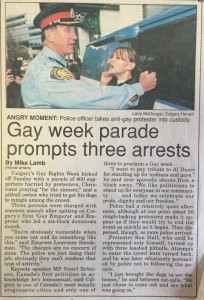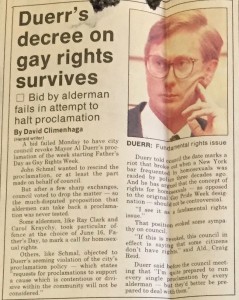When Alberta’s NDP government unveiled legislation last November prohibiting discrimination against transgendered people, Nancy Miller couldn’t have been happier.
“It was a fantastic day for me to stand at the legislature and see this progressive government do the right thing…to do things that should have been done years ago,” she says.
A long time activist in Calgary’s LGBTQ (Lesbian, Gay, Bisexual, Transgendered and Queer) community, she says legislation like this is the culmination of years of hard work.
“That was the first time I had ever seen my government take a step forward without being dragged kicking and screaming through the courts to address issues of human rights,” she says.
The fight to include Alberta’s LGBTQ community under the province’s anti-discrimination laws has been a long one. For years, in cities like Calgary, many members of the gay community were just surviving in the shadows, Miller says. So to help bring the issues the community was facing into the light, Miller and a group of like-minded activists organized Calgary’s first gay pride parade.
Held on June 16, 1991, it attracted over 400 participants.
“[We] really felt people needed to be out there and visible and to make people aware that their brothers, sisters or parents might be LGBTQ,” she says.
Even on the day of the march, some people were afraid to show their identities she says. To help make them feel better ‘Lone Ranger’ masks were handed out before the parade so some marchers could conceal their identities.

“At that time you could lose your job, get kicked out of your rental apartment; you could lose custody of your children,” she says. “So school teachers, social workers would get Lone Ranger masks.”
Al Duerr, Calgary’s mayor from 1989 to 2001 was an early supporter of the LGBTQ community.
Duerr managed to get a “gay rights week” proclamation issued by the city the year of the first parade, despite opposition from some members of the city council. He was accused by some of being part of the “gay agenda” he says.
“The only agenda was basic human rights and people wanting to live their lives to the fullest and enjoy what our country had to offer,” he says.
Kevin Allen, lead researcher at the Calgary Gay History Project says the early days of the gay rights movement in Alberta were rough times for the community.
“[In] the 1990s [it was] a culture war,” he says. “It was us versus them.”
He adds the parade helped draw attention to the cause of LGBTQ rights.
“I think the parade showcased queer visibility, which made everyone, gay and straight, more aware of the human rights issues,” he says.

And while the tone of the parade may have changed over the years, it’s mainly due to Calgary’s changing social makeup, he says.
“[It has] become more of a celebratory event,” he says. “[But the parade] has changed as society has changed, and it now attracts tens of thousands of people,” he says.
Looking back at all of what has changed for LGBTQ people in Alberta, Miller says the fight isn’t over.
“I never lose sight of the fact that there [are] people living in small towns in Alberta that are still forced to stay in the closet [and] fear for their lives,” she says. “People die for whom they love. And even though we have come a long way, there’s still a ways to go.”
======================
The documentation
Gay rights parade poster
- This is a poster advertising the march on June 16, 1991. Even though it says “second annual,” this was actually the first official parade on city streets organized by this group.
- I obtained the poster from the Calgary Gay History Project
- The documentation is useful because it gives a visual representation of an upcoming event.
Calgary Herald article by Mike Lamb
- This is a Calgary Herald article by Mike Lamb detailing some of the drama that unfolded during the parade
- I obtained the clipping from the Calgary Gay History Project.
- The documentation is useful because it details the arrests made that day, as well the behaviour of some of the anti-gay protestors.
Calgary Herald article by David Climenhaga
- This is a Calgary Herald clipping by David Climenhaga that talks about the opposition the mayor of Calgary had to deal with when he declared a gay rights week in the city.
- I obtained the clipping from the Calgary Gay History Project.
- The documentation is useful because it details how much resistance the mayor got from some members of the city council over the gay rights week proclamation.
Alberta bill-7 PDF
- This is the bill the Alberta government introduced last fall banning discrimination against people who are transgendered.
- I obtained the bill from the Alberta Government web site
- This documentation is useful because it is a primary document and shows what changes are being made to the law in Alberta.

